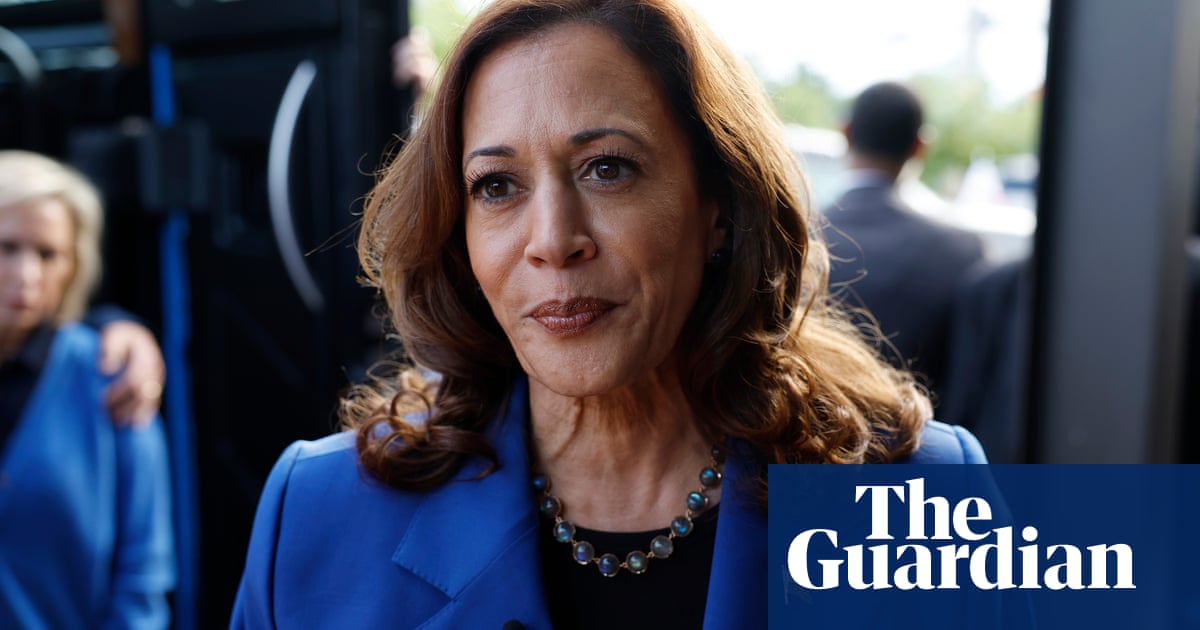Donald Trump spent Thursday in Michigan raving about bacon, windmills, Al Capone, trans boxers, nuclear war and, of course, his crowd size. Weird! Kamala Harris and Tim Walz gave an interview on CNN that was … radically normal.
Just as she did a week ago at the Democratic national convention, the vice-president was comfortable and composed, solid and unspectacular, doing enough to clear the bar and doing herself no harm. She turned a much hyped first interview as nominee into a soon-to-be-forgotten pit stop along the campaign trail.
Perhaps most important was the personality test. The old saw in presidential campaigns was: which candidate would you rather have a beer with? Harris and Walz came over as the couple you’d be fine sharing cake and coffee with at your kids’ birthday party. The same cannot be said of the former president and his running mate, JD Vance.
Democrats’ bet is that Americans crave such relatability after a decade of Trump’s malignant narcissism and Joe Biden’s struggles with old age. The current president turned every interview into a nerve-wracking high-wire act. Harris was a fresh-faced model of steadiness by comparison.
But as the 27-minute interview unfolded, she was notably more at ease embracing Biden and his legacy than her own historic candidacy as potentially the first Black female president. Democrats may value her loyalty in refusing to disown her boss. Republicans may scent an opportunity to portray her as Biden-lite.
Perhaps Harris’s weakest answer was her first. Wearing grey and sitting in a cafe in Savannah, Georgia, she was asked by CNN’s Dana Bash: “If you are elected, what would you do on day one in the White House?” Harris replied: “Well, there are a number of things. I will tell you, first and foremost, one of my highest priorities is to do what we can to support and strengthen the middle class … ”
When Bash pressed: “So, what would you do day one?”, Harris talked about the “opportunity economy”. Political consultant Frank Luntz was unimpressed, tweeting: “Her answer was so vague that it was essentially worthless. Not a good start.”
Then again, when Trump was asked the same question about day one, he said he would be a dictator. So there’s that.
Harris was then asked about her policy reversals on fracking and the Green New Deal. She avoided a gaffe but gave an answer that bordered on a wonky word salad: “I have always believed – and I have worked on it – that the climate crisis is real, that it is an urgent matter to which we should apply metrics that include holding ourselves to deadlines around time.”
She did better explaining a U-turn on decriminalising illegal border crossings, pointing out that she is the only person in the race who has prosecuted transnational criminal organisations who traffic in guns, drugs and human beings, then pivoting to accuse Trump of sinking border security legislation. “He killed the bill – a border security bill that would have put 1,500 more agents on the border.”
Policy is often a surrogate for values. Harris’s central message on her policy shifts: “My values have not changed.” Translation: you know and I know that some policies have to be tweaked, or made vague, if I want to win swing state voters.
Addressing a national audience, rather than a rally, Harris was also careful not to alienate the type of Republicans who supported Nikki Haley. She said she would appoint a Republican to her cabinet if elected, though she did not have a particular name in mind. “I have spent my career inviting diversity of opinion.”
When Bash asked her about Trump’s questioning of Harris’s racial identity, she could have unleashed a long and angry tirade about his history of racism. Instead she wisely chose the pithy response: “Same old tired playbook, next question please.”
Bash asked: “That’s it?” Harris confirmed: “That’s it.”
after newsletter promotion
This might offer a clue as to her strategy for next month’s presidential debate: cut Trump down to size with a short sharp line, then move on to her own more optimistic, future-facing agenda. Call it the “Honey, I Shrunk the Trump” approach.
Much was made of the fact that Walz was involved in the interview. In the end, Harris got the lion’s share, with Walz looking down at the ground during the tougher moments. She seemed to watch him with a benign, proud smile.
But when Bash put it to Walz that he once said he carried weapons in war, even though he never deployed in a war zone, Walz parried: “Yeah … in this case, this was after a school shooting … and my wife, the English teacher, told me my grammar is not always correct.” It just felt like a dodge.
The interview ended with Bash asking about a photo of one of Harris’s young grandnieces watching as she delivered her address to the last week’s convention – and the historic nature of candidate. Harris seemed to think cautiously, as if wary of an identity politics trap.
“I am running because I believe that I am the best person to do this job at this moment for all Americans, regardless of race and gender,” she said. “But I did see that photograph, and I was deeply touched by it.”
Just like her convention speech, it was a far cry from the “I’m with her” chants of Hillary Clinton’s effort to smash the glass ceiling eight years ago. Harris is adopting a show, don’t tell approach. That left viewers not entirely clear how a Harris administration would differ from a Biden one. But they may also have no doubt that Harris and Walz would represent a return to the politics of normal.
